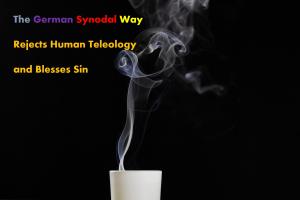On March 10th 2023, the German Synodal Way (GSW) approved a five-page document allowing for the blessing of same sex couples. In doing so, the GSW rejected, in short order, divine revelation (the Bible), Natural Law, and official Church teaching on human sexuality (human teleology). Furthermore, the GSW voted to overrule God on sin and allowed for mere men within the Church (mere men for now, anyway) to bless sin in the name of “love.”
In this article, I examine the reasoning behind the “approved” document in light of official Church teaching. The GSW’s usurpation of God’s authority and that of the pope in Rome represents yet another step toward schism in Germany. The pope MUST correct the GSW. The time for observing patience is over.
The Parameters for “Adjustments” Within the Church
As a refresher, for the Church to “adjust” its understanding of a theological view, it must adhere to certain parameters. If the “adjustment” does not meet the parameters, the “adjustment” shows itself false and dead on arrival. I touched on the parameters in my article How Can the Church Change Its Views on Same-Sex Marriage? Therefore, in order for the GSW to adjust the Church’s view on blessing sin, it MUST demonstrate it did so through said parameters. If not, well, I repeat myself.
German Synodal Way’s Reasons to Bless Sin
Now, let’s examine the reasons the GSW gives for blessing sin and if they meet the Church’s established parameters.
Conscience
The decision to bestow this blessing is therefore made by the pastors according to their conscience and in many cases in conflict with magisterial guidelines.
Conscience does not justify changing Church teaching regarding blessing sin. A person who seeks to do so demonstrates their conscience ill-formed, regardless of if this conscience finds itself attached to a pastor. And what are the “magisterial guidelines?” Are these “guidelines vague? No.
The answer to the proposed dubium does not preclude the blessings given to individual persons with homosexual inclinations, who manifest the will to live in fidelity to the revealed plans of God as proposed by Church teaching. Rather, it declares illicit any form of blessing that tends to acknowledge their unions as such. In this case, in fact, the blessing would manifest not the intention to entrust such individual persons to the protection and help of God, in the sense mentioned above, but to approve and encourage a choice and a way of life that cannot be recognized as objectively ordered to the revealed plans of God.
At the same time, the Church recalls that God Himself never ceases to bless each of His pilgrim children in this world, because for Him “we are more important to God than all of the sins that we can commit”. But he does not and cannot bless sin: he blesses sinful man, so that he may recognize that he is part of his plan of love and allow himself to be changed by him. He in fact “takes us as we are, but never leaves us as we are.”
For the above-mentioned reasons, the Church does not have, and cannot have, the power to bless unions of persons of the same sex in the sense intended above. [emphasis added]
Parameter Check:
So far NOT so good.
Discrimination
The refusal to bless the relationship of two people who want to live their partnership in love, commitmentm and responsibility to each other and to God proves to be merciless or even discriminatory in a society that has achieved human dignity and free self-determination as maxims of moral standardization.
Moreover, the Church’s human sexuality views in themselves are considered “discriminatory” by many people (and governments). The Church teaches that God created humans for a purpose (teleology). This purpose includes the whole body, including the parts used for sex. Most non-Catholics (and it appears some Catholics in Germany) reject God’s intended purpose for human sexuality. The above appeal to continued “mercilessness” and “discrimination” by the Church juxtaposed to the achievement of “human dignity and free self-determination” on the part of “morally” superior secular society in Germany reflects the true authority of this document. Hint: Not the Catholic Church. Again, the Church cannot bless sin.
Parameter Check:
Fail.
Theology of Grace
This is all the more serious because such a refusal cannot be convincingly justified in terms of the theology of grace. This not only burdens the proclamation of God’s philanthropy and the double commandment of loving one’s neighbor and God, but also raises serious questions about the credibility of liturgical action in our cultural sphere.
The term “theology of grace” appears only once in the document and gets no definition. It appears the “theology of grace” means God’s unconditional love and God’s command to love our neighbor. Nowhere in the entirety of Catholic teaching do we see the blessing of sin as a reflection of God’s unconditional love or sinning against one’s neighbor equating to loving that neighbor. Again, the last part concerning “credibility” shows the true authority here. Those within the “cultural sphere” demand change, therefore the Church must give it to them.
Parameter Check:
Another fail.
Ambiguity of Pope Francis
Pope Francis’ letter is ambiguous with regard to the appreciation of non-sacramental partnerships and a possible analogy to sacramental marriage (cf. AL 251 and AL 292). What is clear, however, is the distancing from the classic assessment of couples who do not live together in a sacramental union. For Pope Francis “it can no longer simply be said that all those in any “irregular” situation are living in a state of mortal sin and are deprived of sanctifying grace.” (AL 301)
Papal ambiguity has never been used as justification for theological “adjustments,” so this point received a fail in the parameter check right off. But what of Amoris Laetitia (AL)?
251 In discussing the dignity and mission of the family, the Synod Fathers observed that, “as for proposals to place unions between homosexual persons on the same level as marriage, there are absolutely no grounds for considering homosexual unions to be in any way similar or even remotely analogous to God’s plan for marriage and family”. [emphasis added]
“Absolutely no grounds” sounds like absolute language, the opposite of vague language. Why does Pope Francis use the word “absolutely?” Because God cannot bless sin.
292 Christian marriage, as a reflection of the union between Christ and his Church, is fully realized in the union between a man and a woman who give themselves to each other in a free, faithful and exclusive love, who belong to each other until death and are open to the transmission of life, and are consecrated by the sacrament, which grants them the grace to become a domestic church and a leaven of new life for society. Some forms of union radically contradict this ideal, while others realize it in at least a partial and analogous way. The Synod Fathers stated that the Church does not disregard the constructive elements in those situations which do not yet or no longer correspond to her teaching on marriage.
Pope Francis here affirms the teleology of the human person as it relates to human sexuality. Clearly, the reference to “partial” and “analogous,” the apparent “ambiguity” of Pope Francis cannot justify blessing gay unions, as these unions “radically contradict” human teleology. This also applies to the reference to Amoris Laetitia 301. Again, God cannot bless sin.
God Blessing Love, Not Sin
The concern that the Church could thereby approve a sinful situation has so far stood in the way of an official recognition of such a blessing. This concern loses plausibility through the further development undertaken by Pope Francis. The celebration differs from a marriage ceremony. Liturgical possibilities to avoid an analogy to marriage are sufficiently available. The blessing reinforces what already exists in the couple’s relationship in terms of love, commitment and mutual responsibility. God’s support is requested and promised for the future of all that is good.
Interestingly enough, the most accurate sentence in this whole document appears in the first sentence of the paragraph above. The Church cannot offer a blessing on same-sex couples because to do so approves of a sinful situation. End of story. When reading Pope Francis accurately, the concern remains. The Church calls this sin. God cannot bless murder, either. St. Thomas Aquinas defined love as “the choice to will the good of the other.” Sin damages the other.
Parameter Check:
Failed, again.
Borrowed Customs and Societal Advancement
The assessment of the diversity of lasting relationships and the mutual responsibility perceived in them has changed in Germany. Partnerships that are binding and loving are met with a high level of social acceptance – irrespective of a previous union or the gender of the two partners. This esteem must also find a convincing expression in the liturgy of the Church. This is how the Church lives up to her claim “They borrow from the customs and traditions of their people, from their wisdom and their learning, from their arts and disciplines, all those things which can contribute to the glory of their Creator, or enhance the grace of their Savior, or dispose Christian life the way it should be.” (AG 22).
At the same time, this shows the deep conviction of the Church: “The experience of past ages, the progress of the sciences, and the treasures hidden in the various forms of human culture, by all of which the nature of man himself is more clearly revealed and new roads to truth are opened, these profit the Church, too.” (GS 44) [emphasis added]
The paragraph above demonstrates that the motivation to bless sin springs not from a theological source, but a cultural one. Modern society’s advancement in social acceptance and science now means the Church MUST also “advance” and bless sin.
Parameter Check:
Failed yet again.
A Sign of Reconciliation
Often same-sex couples and remarried divorcees have experienced exclusion and depreciation in our Church. The possibility of publicly placing their partnership under God’s blessing does not make up for these experiences. However, it offers the Church the opportunity to show appreciation for the love and values that exist in these relationships and thus ask for forgiveness and make reconciliation possible.
The blessing is a sign for many couples and their children to be accepted in this Church and the congregations are encouraged to welcome them.
The Church has never excluded and depreciated any same-sex and remarried divorcees. The Church has called all its members to follow Christ and live holy lives in preparation for heaven. Like her founder, Jesus Christ, the Church calls all to “go and sin no more” (John 8:11). Furthermore, the Church need not seek reconciliation and forgiveness for its teaching on human sexuality. Nor for the teleology of God’s plan for the human person. All are welcome within the Church, but not all are welcome to have their sins blessed by the Church.
Final Parameter Check:
Utter failure.
Final Assessment for the GSW Theological “Adjustments”
In conclusion, the German Synodal Way’s actions on March 10th, 2023, represent a clear and intentional move towards schism in Germany. In no way does their “adjustment” to Catholic theology meet any established parameters the Church sets forth for justification. When examined, the justifications fall utterly short.
The GSW appeals to:
- A misapplication of conscience
- An accusation of discrimination
- A faulty understanding of grace
- Perceived ambiguity of Pope Francis
- An incorrect definition of love
- An appeal to modern culture and science
- And a misplaced call for forgiveness and conciliation.
The aforementioned reasonings DO NOT meet the Church’s parameters. The “reason” tells us two things. First, the GSW does not consider sexual activity between people of the same sex (and divorcees) as sin. And second, GWS considers itself the ultimate authority on the matter. Not the pope in Rome or God Himself. They now bless sin. God and the pope can go fly a kite.
If you enjoy my writing and want to support my work, please consider donating a monetary gift of any size or quantity by clicking here. Thank you!
Read my other writing here.
Please click the link below to join.
Voices of the Faithful in the Synod on Synodality
Please make your voice heard.
I Support Church Teaching in the Synod of Synodality













